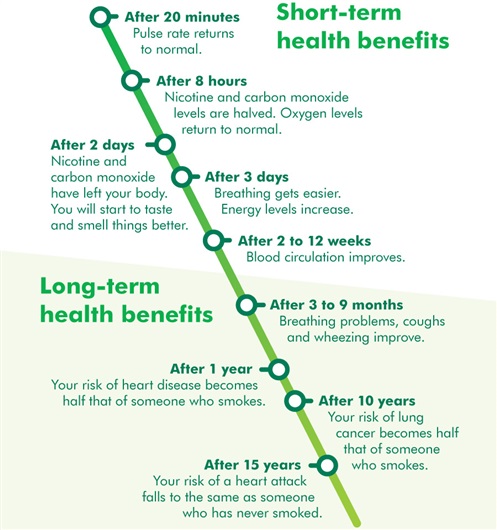National No-smoking Day can make many people think about stopping smoking. In this blog information development nurse Teri shares 10 top tips for preparing yourself to stop.
After being diagnosed with cancer, many people want to make positive changes to their lives. This often includes thinking of ways to live a healthier lifestyle. If you are a smoker and want to stop, it’s a decision that will certainly benefit your overall health. The timeline below shows you what the health benefits of stopping smoking can be.

Stopping smoking may also increase the chances of cancer treatment being effective, reduce side effects and help to lower the risk of cancer coming back after treatment.
Making the decision and really wanting to succeed are the first steps to becoming a non-smoker. You can increase your chances of success by preparing for possible problems before you stop. It can also help to make sure that you have support in place to help you overcome them.
Giving up smoking can be stressful and difficult to do, but it will ultimately help you to feel better and be healthier.
So, what can you do to prepare yourself for stopping smoking?
1. Make a list of your reasons for stopping
You can use this to motivate yourself at times when you feel tempted to smoke. There are lots of benefits to stopping smoking. Put your list somewhere where you can see it, as a reminder to you.
2. Find help and support
Talk to people who can give you help and support to quit. This might include your doctor, family, friends and colleagues. Tell them the date you plan to stop smoking. Your doctor or pharmacist can offer practical help and advice or refer you to a local group for support.
3. Use the NHS Stop Smoking Services
NHS stop smoking services can really make a difference to your chances of success. Research shows that people who use them are twice as likely to succeed as people who try to give up on their own. Speak to your doctor or use the list of UK stop smoking services at the end of this blog to find support.
4. Prepare to cope with stress
Many smokers use cigarettes to cope with stress. The shock of being diagnosed with cancer or coping with treatment can make it harder to quit. It may be helpful to try to find other ways of coping with stress. This could be exercising or using relaxation or meditation aids like books, CDs, podcasts and mobile phone apps. Some people use complementary therapies such as hypnotherapy or relaxation and meditation techniques. If you think stress may be a problem for you, ask your specialist nurse or GP for advice.
5. Set a date to stop
The most effective way of reducing harm from smoking is to stop completely. Try setting a date to stop and mark it on your calendar. If a friend or a family member also wants to quit, it may help to pick a date to stop together.
6. Use a smoking diary
Keeping a smoking diary can help you work out your smoking habits. It will help you identify situations that might make you want a cigarette and what times of the day are difficult for you. Use the diary to record every cigarette you smoke and what triggered you to want to smoke. Having a clearer picture of your habits will help you think about what other things you could do in those situations, instead of smoking.
7. Set yourself goals
You could set yourself goals and reward yourself when you meet them to help you get through the first day, week and month smoke-free.
8. Find a way to reduce cravings
The first 3 to 4 days after you have stopped smoking can be the most difficult. You may be feeling the effects of nicotine withdrawal and this might tempt you to smoke again.
There are nicotine replacement therapies (NRT) and medicines that can improve your chances of getting through withdrawal effects. Your GP or NHS stop smoking adviser can talk to you about your options. If you plan to use medicines to help you cope, make sure you get them well before the date you plan to give up smoking.
9. Get rid of cigarettes, ashtrays and lighters
Do this the day before you give up. Check the house, the car and your clothes for any cigarettes.
10. Don’t stop trying
If you don’t succeed in giving up smoking the first time you try, keep trying. Lots of people try a few times before they stop completely. Try to focus on the benefits of stopping and why you want to stop, and try again.
If National No-Smoking Day has encouraged you to quit, we hope these tips will help you prepare. We will now list the contact details for some stopping smoking services:
To see what else Macmillan's cancer information team has been blogging about, please visit our blog home page! You can subscribe to receive our blogs by email or RSS too.
We're with you every step of the way
The Macmillan team is here to help. Our cancer support specialists can answer your questions, offer support, or simply listen if you need a chat. Call us free on 0808 808 00 00.
Comments? Feel free to add them below (you need to be logged in).
Keep in touch Follow Macmillan’s cancer information team on Twitter @mac_cancerinfo
Whatever cancer throws your way, we’re right there with you.
We’re here to provide physical, financial and emotional support.
© Macmillan Cancer Support 2026 © Macmillan Cancer Support, registered charity in England and Wales (261017), Scotland (SC039907) and the Isle of Man (604). Also operating in Northern Ireland. A company limited by guarantee, registered in England and Wales company number 2400969. Isle of Man company number 4694F. Registered office: 3rd Floor, Bronze Building, The Forge, 105 Sumner Street, London, SE1 9HZ. VAT no: 668265007